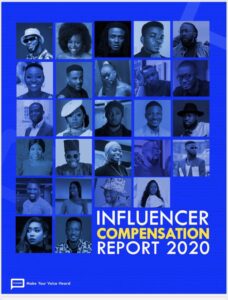In the last five years, the rise of influencer marketing has been astronomical. Social media has become a more integrated part of our lives and people are turning to their favourite Twitter personalities, Instagram stars and YouTubers for recommendations on purchasing decisions. Gone are the days of celebrity endorsements, where companies would use celebrities to hawk their wares, and celebrities would use companies for money and free stuff. These days anybody with a social media presence can grow to become an influencer.
In 2019, marketing and public Relations technology company, Plaqad reportedly paid out over 200 million Naira to influencers on multiple campaigns. This is a testament to the growing demand for brand influencers. On the client-side, brand managers prefer working with influencers because they are easier to work with, and have a deeper and trusted relationship with their audiences.
The demand for influencers can only go higher, as brands are set to spend up to $15 billion globally on influencer marketing by 2022. In its 2020 Influencer Compensation Report, Plaqad reported that 57% of Nigerian brands spent between N10 million to N50 million on influencer marketing campaigns, while 11% had a budget of over 50 million Naira and 33% spent less than 10 million Naira on the same service.

What is to come
With the COVID-19 disruption and people spending more time at home, brands will continue to work with influencers to communicate messages that are inspirational, genuine and community-driven. Also, niche influencers – micro and nano – will enjoy more patronage due to their high engagement, authenticity, and low-costs.
With many people still relying on influencers for credible information on brands and products, the effectiveness of influencer marketing should not be underestimated.
